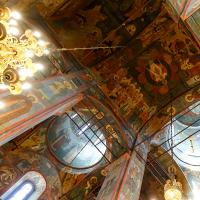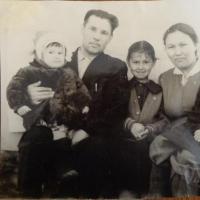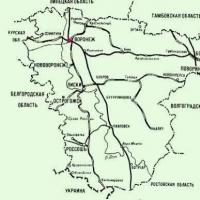Perseus mythology. Hercules. Great-grandson of Perseus or son of Zeus? The image of Perseus in art
One day, the king of Argos Acrisius was predicted that his daughter Danae would give birth to a son, by whose hand he was destined to die. To avoid
fulfillment of the prediction, then King Acrisius locked his daughter in a copper-stone dungeon, but Zeus fell in love with Danae, entered there in the form of golden rain, and after that Danae’s son Perseus was born.
Hearing the cry of the child, the king ordered Danae and her baby to be taken out of there, imprison them both in a barrel and throw them into the sea. For a long time Danaya and the child were carried by the raging waves, but Zeus protected her. Finally she was thrown ashore on the island of Serif. At this time, a fisherman named Dictys was fishing on the seashore. He noticed a barrel and pulled it ashore. Having freed Danae and her little son from the barrel, he led them to his brother, the king of the island Polydectes. He received them cordially, left them to live in his royal house and began to raise Perseus.
Perseus grew up and became a handsome young man. When Polydectes decided to marry Danae, Perseus prevented this marriage in every possible way. For this, King Polydectes disliked him and decided to get rid of him. He instructed Perseus to perform a dangerous feat - to go to a distant country and cut off the head of the terrible Medusa, one of the three terrible monsters called Gorgons. There were three of them, and one of them was called Stheno, the other was Euryale, and the third was Medusa, and only this of the three was mortal. These winged snake-haired maidens lived in the far West, in the region of Night and Death.
They had such a terrible appearance and such a terrible look that anyone who saw them turned to stone at their mere glance.
King Polydectes hoped that if young Perseus met Medusa in that distant country, he would never return back.
So the brave Perseus set off on a journey in search of these monsters and, after long wanderings, finally came to the region of Night and Death, where the father of the terrible gorgons, named Forkys, reigned. Perseus met three old women on the way to the Gorgons, who were called Grays. They were born with gray hair, all three had a single eye and only one tooth, which they shared alternately.
These grays guarded the Gorgon sisters. And along the way to them there lived good nymphs.  Perseus came to the nymphs, and they gave him winged sandals that could easily support him in the air. They also gave him a bag and a helmet of Hades, made from dog skin, which makes a person invisible. The cunning Hermes handed him his sword, and Athena handed him a metal shield, smooth as a mirror. Armed with them, Perseus took off on his winged sandals, flew across the ocean and appeared to the Gorgon sisters. When he approached them, the terrible sisters were sleeping at that time; and Perseus cut off Medusa's head with his sharp sword and threw it into the bag given to him by the nymphs. Perseus did all this without looking at Medusa - he knew that her gaze could turn him to stone, and held a mirror-smooth shield in front of him. But as soon as Perseus had time to cut off Medusa’s head, the winged horse Pegasus immediately emerged from her body and the giant Chrysaor grew up.
Perseus came to the nymphs, and they gave him winged sandals that could easily support him in the air. They also gave him a bag and a helmet of Hades, made from dog skin, which makes a person invisible. The cunning Hermes handed him his sword, and Athena handed him a metal shield, smooth as a mirror. Armed with them, Perseus took off on his winged sandals, flew across the ocean and appeared to the Gorgon sisters. When he approached them, the terrible sisters were sleeping at that time; and Perseus cut off Medusa's head with his sharp sword and threw it into the bag given to him by the nymphs. Perseus did all this without looking at Medusa - he knew that her gaze could turn him to stone, and held a mirror-smooth shield in front of him. But as soon as Perseus had time to cut off Medusa’s head, the winged horse Pegasus immediately emerged from her body and the giant Chrysaor grew up.
At this time the sisters of Medusa woke up. But Perseus put on his invisibility helmet and, wearing winged sandals, flew back, and his terrible sisters, the Gorgons, could not catch up with him.
The wind lifted him high into the air, and when he flew over the sandy Libyan desert, drops of Medusa's blood fell to the ground and poisonous snakes, of which there are so many in Libya, grew from her blood.
Mighty winds arose and began to carry Perseus through the air in different directions; but by evening he managed to reach the far West, and young Perseus ended up in the kingdom of the giant Atlas. Fearing to fly at night, Perseus sank to the ground.
And the giant Atlas was a rich king of that country, and he owned many herds and huge gardens; in one of them grew a tree with golden branches, and the leaves and fruits were also all golden.
It was predicted to Atlas that one day the son of Zeus would appear and pluck golden fruits from the tree. Then Atlas surrounded his garden with a high wall and instructed the young Hesperides and the terrible dragon to guard the golden apples and not let anyone near them.
 Perseus appeared to Atlas and, calling himself the son of Zeus, began to ask him to receive him. But Atlas remembered the ancient prediction and refused shelter to Perseus and wanted to drive him away. Then Perseus took Medusa's head out of the bag and showed it to Atlas. The giant could not resist the terrible power of Medusa and was petrified from horror. His head became the top of a mountain, and his shoulders and arms became its spurs; his beard and hair turned into dense forests. A spiky mountain rose and grew to enormous sizes. She reached the very sky, and it lay with all its stars on the shoulders of Atlas, and from then on the giant held this heavy burden.
Perseus appeared to Atlas and, calling himself the son of Zeus, began to ask him to receive him. But Atlas remembered the ancient prediction and refused shelter to Perseus and wanted to drive him away. Then Perseus took Medusa's head out of the bag and showed it to Atlas. The giant could not resist the terrible power of Medusa and was petrified from horror. His head became the top of a mountain, and his shoulders and arms became its spurs; his beard and hair turned into dense forests. A spiky mountain rose and grew to enormous sizes. She reached the very sky, and it lay with all its stars on the shoulders of Atlas, and from then on the giant held this heavy burden.
Having thus taken revenge on Atlas, the next morning Perseus rose again on his winged sandals into the air, and he flew for a long time until he finally arrived at the shores of Ethiopia, where Cepheus reigned.
Perseus saw the young beautiful Andromeda chained to a rock on a deserted shore. She had to atone for the guilt of her mother Cassiopeia, who once, boasting of her beauty to the nymphs, said that she was the most beautiful of all. Angry, the nymphs complained to Poseidon and asked to punish her. And Poseidon sent a flood and a terrible sea monster to Ethiopia, devouring people and livestock.
The oracle predicted that Kepheus should give his daughter Andromeda to this terrible monster to be devoured; and so she was chained to a sea rock.
Perseus saw the beautiful Andromeda chained to a rock. She stood motionless, and the wind did not move her hair, and if there had not been tears in her eyes, one could have mistaken her for a marble statue.
The amazed Perseus looked at her, went down to her, and began asking the crying girl what her name was, where she was from and why she was chained to a desert rock. Not right away, but finally the girl told Perseus who she was and why she was chained to this rock.
Suddenly the sea waves rustled and a monster emerged from the depths of the sea. Opening its terrible mouth, it rushed towards Andromeda. The girl screamed in horror, King Kepheus and Cassiopeia came running to her scream, but they could not save their daughter and began to mourn her bitterly. Then Perseus shouted to them from above:
- I am Perseus, the son of Danae and Zeus, who cut off the head of the terrible Medusa. Promise me to give your daughter as my wife if I save her.
Kepheus and Cassiopeia agreed to this and promised to give him not only their daughter, but also their entire kingdom in addition.
At that time the monster swam, cutting through the waves like a ship, closer and closer, and now it was almost at the very rock. Then young Perseus rose high into the air, holding his shiny shield in his hand. The monster saw the reflection of Perseus in the water and rushed at him in rage. Like an eagle that pounces on a snake, so Perseus flew at the monster and plunged his sharp sword deep into it. The wounded monster flew high into the air, then rushed down at Perseus, like a wild boar pursued by dogs. But the young man in his winged sandals dodged the monster and began to strike him with his sword, blow after blow, and then black blood gushed from the monster’s mouth. During the battle, Perseus's wings got wet; with difficulty he flew to the shore and, noticing a rock rising from the sea, saved himself on it. Holding the stone with his left hand, he inflicted several more wounds on the monster with his right hand, and the monster, bleeding, sank to the bottom of the sea. 
The young man rushed to Andromeda and freed her from the chains.
The delighted Kepheus and Cassiopeia joyfully met the young hero and took the bride and groom to their home. Soon a wedding feast was arranged, and Eros and Hymen were at their wedding with torches in their hands, playing flutes and lyres, singing funny songs; The wedding guests listened to the story of the exploits of the hero Perseus.
But suddenly a crowd appeared at Kefei’s house, led by the king’s brother Phineus, who had previously wooed Andromeda, but left her during the trouble.
And so Phineus demanded that Andromeda be given to him. He raised his spear at Perseus, but Cepheus shielded him. Then the enraged Phineus threw his spear at the young man with all his might, but did not hit. Perseus grabbed the same spear, and if Phineas had not hidden behind the altar, it would have pierced his chest, but the spear hit one of Phineus’s soldiers, who fell to the ground dead. And then a bloody battle began at a merry feast. Like a lion, Perseus fought against numerous enemies; the young hero was surrounded by a large crowd of enemies led by Phineus. Leaning against a high column, he hardly fought off the warriors attacking him, but finally saw that he could not defeat his enemies who were superior in strength. Then he took Medusa’s head out of the bag, and one after another, at the sight of her, the enemies turned to stone. Now the last warrior stands like a stone statue with a spear raised in his hand.
Phineus saw in horror that his warriors had turned to stone. He recognized them in stone statues, began to call them and, not believing his eyes, touched each of them - but he only had a cold stone at hand.
In horror, Phineus extended his hands to Perseus and asked to spare him. Laughing, Perseus answered him: “My spear will not touch you, but I will erect you as a stone monument in the house of my father-in-law.” And he raised the head of the terrible Medusa above Phineus. Phineus looked at her and immediately turned into a stone statue, expressing cowardice and humiliation.
Perseus married the beautiful Andromeda and went with his young wife to the island of Serif, where he saved his mother by turning King Polydectes, who was forcing her into marriage, into stone, and Perseus gave power over the island to his friend Dictys.
Perseus returned the winged sandals to Hermes, and the helmet of invisibility to Hades; Pallas Athena received the head of Medusa as a gift and attached it to her shield.
Then Perseus went with his young wife Andromeda and his mother to Argos, and then to the city of Larisa, where he took part in games and competitions. Perseus’s grandfather, who moved to the country of the Pelasgians, was also present at these games. Here the oracle's prediction was finally fulfilled.
While throwing the disc, Perseus accidentally hit his grandfather with it and inflicted a mortal wound on him.
In deep sorrow, Perseus found out who this old man was and buried him with great honors. Then he gave power over Argos to his relative Megapent, and he himself began to rule Tiryns.
Perseus lived happily with Andromeda for many years, and she bore him beautiful sons.
Myths and legends of ancient Greece. Illustrations.
This term has other meanings, see Perseus (meanings). Perseus and Andromeda ... Wikipedia
This term has other meanings, see Perseus (meanings). Perseus ... Wikipedia
The Greeks believed that every person who achieves success continues to influence other people after his death, and therefore deserves religious veneration. In late antiquity, some of these heroes were especially revered, especially children... ... Collier's Encyclopedia
- “Medusa”, Caravaggio, 1598 99, Uffizi. Image of the severed head of the Gorgon Gorgon Medusa (Greek Μέδουσα, more precisely Medusa “guardian, protector, mistress”) the most famous of the Gorgon sisters, a monster with a woman’s face and snakes instead of hair... ... Wikipedia
Traditional religions Key concepts God · Mother goddess ... Wikipedia
Zeus Zeus God of thunder and lightning, supreme god Mythology: Ancient Greek In other cultures: Jupiter Father: Kronos Mother: Rhea ... Wikipedia
Ancient Greek mythology as a set of tales of the ancient Greeks about gods, demons and heroes represented an attempt by primitive man to comprehend the surrounding reality and was a generalized transfer of tribal relations to nature and society.... ... Soviet historical encyclopedia
The essence of historical mythology becomes understandable only when taking into account the peculiarities of the primitive communal system of the Greeks, who perceived the world as the life of one huge tribal community and in myth generalized the entire diversity of human relationships and natural phenomena. G. m.... ... Encyclopedia of Mythology
This term has other meanings, see Summer (meanings) ... Wikipedia
This term has other meanings, see Andromeda. Perseus and Andromeda Andromeda (ancient Greek ... Wikipedia
Books
- The fabulous antiquity of Hellas (audiobook MP3 on 2 CDs), Thaddeus Zelinsky. Thaddeus Frantsevich Zelinsky was born near Kyiv, by nationality - Pole, by language and culture - Russian. Having completed his education at the Russian Philological Seminary at the University of Leipzig, ... audiobook
- Mythology in 30 Seconds, Robert A. Segal. Why did Hercules need to perform 12 labors? How did Narcissus find the love of his life? And why did it take Odysseus 10 years to travel 500 miles? You may remember these...
Ancient Greece existed for a very long time, and it seems that only a few people are interested in it, who like to study the Ancient World and everything connected with it, including ancient Greek mythology. However, if we look in more detail, we can see the influence that Ancient Greece had on the development of civilization, manifesting itself in various types of art.
The Origin of Myths about Ancient Greece
A myth is a set of stories that were important for culture, life and human development. It is difficult to prove whether the story actually happened, but it is also impossible to refute it. C “myth” means “tradition”, “legend”, and therefore, it is a narrative that carries a certain meaning - to convey to a person some idea or teach him something.
Tales about Ancient Greece began to take shape even before the advent of writing, and therefore were passed on from mouth to mouth. The story was told about the life of the Greeks and fictional heroes who performed feats, which the people admired. They possessed the highest power, regardless of whether it was Zeus, who was the main one among all, or Hercules, who performed feats known to everyone, or the god Perseus, who was half god, half man, but also distinguished by strength and cunning.
Ancient Greek mythology diagram
It is worth briefly saying that all mythology was divided into three stages: pre-Olympic (the world arose from Chaos and ended with the murder of Cronus, the chief of the gods), Olympian (Zeus seizes power along with his retinue of 12 gods) and heroic (the time when from the gods and heroes are born to mortals, including the god Perseus).
All gods can be divided into supreme and minor. Separately, there were muses who inspired the gods, and also highlighted lower creatures (satirs, nymphs and oras, and monsters with whom the heroes had to fight).
Gods and goddesses of ancient Greek mythology
With the help of mythology and created, invented, the Greeks tried to explain all the events that took place, be it a hurricane, torrential rain or disease.

At first, people imagined gods as terrible animals that prevented them from living well. From here such characters as the Sphinx appeared or further images began to have human faces and the following Greek gods appeared: Perseus, Aphrodite, Zeus, Hephaestus, Demeter and many others. In addition to the fact that the gods had human faces, people also attributed to them qualities (pity, mercy, envy, jealousy). The gods became immortal and communicated with people, and often entered into love relationships.
Perseus was born despite all obstacles. Once upon a time, Danai’s father was predicted that he would die at the hands of his own grandson. He had to lock his daughter in a mansion so that she could not fall in love with anyone, and she was guarded by fierce dogs. But despite everything, Danae was able to give birth to a son and named him Perseus. Whose son of the gods was he according to mythology, and how could he be born?

Zeus was able to overcome all the obstacles, coming to Danae in a very original way, in the form of golden rain, and it was from him that she gave birth to a son, Perseus. Danae's father could not survive this and decided to destroy his daughter and grandson, put them in a wooden box and threw them into the sea. Danaë and Perseus were lucky; they were saved by a fisherman and taken to his brother Polydectes, where they remained to live.
Myth of Perseus
Perseus and his mother lived for a long time with Polydectes, who once wanted to force Danae to be his wife. However, the matured Perseus was against this and directly expressed his word. Then Polydectes, as a diversion, said that he would marry someone else, and Perseus was clearly happy about this and was ready to give any gift, “if necessary, then the head of the Gorgon Medusa,” he said out loud.

Hearing these words, Polydectes sent Perseus for his head, hoping to get rid of him forever. The goddess Athena decided to help Perseus in this battle, since Medusa was her sworn enemies (the Gorgon and her two sisters). Athena gave Perseus a shield polished to a shine, which he had to look into while killing Medusa, otherwise, if he looked straight into her eyes, he would be petrified by her gaze.
Hermes also came to the rescue and gave him an adamantium sickle; it was they who had to cut off the Gorgon’s head. The god Perseus also asked for winged sandals that carried him to the place, a bag for storing the head of Medusa and an invisibility cap. Thanks to her, he escaped from the Gorgon sisters after her beheading.
Perseus traveled around the world for a long time with the head of Medusa the Gorgon, and one day he stopped in Ethiopia, where in the distance he saw a naked girl who was attached to a rock with chains. Perseus immediately fell in love with her - Andromeda, who was the daughter of Kepheus and Cassiopeia. But the sea god Poseidon brought trouble to the kingdom of Kepheus, and it was possible to escape from these troubles only by sacrificing Andromeda, who was soon to be swallowed by a sea monster.

Perseus demanded from Kepheus that if he freed her daughter, he would allow him to marry her. Perseus put on the invisibility cap, took the sickle of Hermes, killed the monster and freed his future wife. Later a great feast was held and a wedding took place. However, the parents did not want this wedding, since they had long promised their daughter to Kefei’s brother. And so Brother Phineus burst into the wedding, and the battle began. Only thanks to the fact that Perseus had the head of Medusa, he was able to destroy his enemies in one fell swoop, turning them into stone.
Reign of Perseus
Perseus and Andromeda returned to the island of Serif, where Polydectes feasted with his faithful jury while Perseus' mother took refuge in the temple from the violence. Perseus said that he had fulfilled his promise and showed at the same moment that Polydectes and all his subjects were petrified.

Together with his mother and his wife, Perseus returned to his homeland. When Danai's father learned that his grandson was alive, he disappeared from sight. But the prophecy overtook him where he did not expect it. During athletic games, Perseus threw a discus that hit grandfather Acrisius in the leg, and he died from this wound. God Perseus was very worried about this and decided to exchange kingdoms with his uncle Megapentus, he himself went to rule in Tiryns, where he built the city of Mycenae and continued to rule there for many years.
The image of Perseus in art
Ancient Greece undoubtedly had a great influence on the development of culture throughout the world. It manifests itself in different fields, be it painting, sculpture or literature. Each god is given a lot of attention, including the image of Perseus can be found in various forms of art.
It cannot be said that Perseus is the god of something (air, fire, water or other natural phenomenon). He is represented as a hero who defeated monsters, and he was a demigod, born from the god Zeus and the mortal Danae.
Since ancient times, mention of it has been found in art. This is how you can see Rembrandt’s painting dedicated to his mother Danae. Many works glorify the act of Perseus when he cut off the head of Medusa the Gorgon, as depicted in the painting by Rubens and
The sculpture “Titan Atlas” tells the story of how Perseus, who, like Hercules, was the son of Zeus, once flew to visit Atlas. The goddess Themis predicted to Atlas that he would die at the hands of the son of Zeus, and he thought that it would be Perseus, and did not accept him as a guest, but abruptly drove him away, for which Perseus showed him the head of Medusa and turned him into a stone statue.
Several paintings also tell about the meeting and rescue of Andromeda: the artist Rubens and G. Vasari created canvases dedicated to this event.
Poseidon is one of the most important gods on Olympus; he is considered the ruler of the sea. Poseidon is the god of the seas, born from Kronos and Rhea, and is the blood brother of Zeus and Hades. By the will of the cast of lots, at the moment of sharing power over the world, he received his destiny, which became the sea.
Who is Poseidon?
Poseidon, whom the Romans call Neptune, was the Greek god of the seas. In existing images, he is presented as a powerful and stern man with a beard and holding a trident. If you carefully examine the portraits, you will find a strong resemblance to Zeus.
Despite being identified with the kingdom of the seas, Poseidon is associated with natural disasters on earth, such as earthquakes. He has a second name - Earth Shaker. The symbols of the animal world for the king are the horse and the bull.
The trait that most conveys the character of the ruler of the seas is a stormy temperament. Poseidon is characterized by irritability, cruelty and vindictiveness, so during periods of his anger a storm, tempest or tornado may begin.
However, the magic trident helped in controlling the elements. If there was a storm at sea, one swing of a magic object - and the sea became absolutely calm.
The sea king rode across the sea in a chariot of unprecedented beauty.
The Lord of the Seas and his beloved women
The first woman Poseidon desired was Thetis, the sea goddess. But Prometheus said that when a child is born, he will be more majestic than his father. And so it happened, Thetis conceived from a mortal and gave birth to the great Greek hero Achilles.

The wife of the god of the seas was Amphitrite, who for a long time rejected his advances. After the rape, she fled to the mountains, where a dolphin found her and persuaded her to marry the ruler. Poseidon highly appreciated these efforts and laid out the image of a dolphin in the sky with stars.
Poseidon was known as a depraved god, and Amphitrite as a jealous and cruel wife. Many women paid for their relationship with her husband. Medusa turned into a monster with dozens of snakes on her head, and Scylla became a barking monster with 6 heads and three rows of large teeth.
After meeting with Demeter, who was looking for her daughter Persephone in all cities, the god of the sea desired her, but was refused. Fleeing from Poseidon, the woman turned into a horse and tried to hide among a massive gathering of animals. But the ruler made a different decision: he turned himself into a stallion, found Demeter and took her by force.
Poseidon and his offspring
The sea goddess gave birth to Poseidon a son and two daughters. Besides them, there are other sons of Poseidon, among whom are many monsters, giants who destroy everything around them, as well as other evil and unbridled descendants. Children often helped their father. The sons of Poseidon adopted cruelty and vindictiveness from him.

Odysseus, who blinded the one-eyed Cyclops named Polyphemus, was pursued by the ruler all his life, since the monster was his child.
Poseidon had countless children with various women, be they mortals or nymphs. Some of Poseidon's sons became famous Argonauts.
Triton, son of Poseidon and Amphitrite
What was the name of Poseidon's son? The Nereid Amphitrite gave birth to Triton, who became the god of Lake Tritonia, located in Libya. It was there that the ship of the traveling Argonauts ended up. Triton helped them return to the sea, and also gave them a handful of land, which would later become the island of Callista.
History of Aginor
In Greek mythology, Aginor is the son of Poseidon, born into the world thanks to a nymph named Livia. Having matured, he married Telefassa, who bore him three sons and a daughter named Europa.

One day Zeus kidnapped a young girl, and the inconsolable father sent all his sons after her, ordering them not to return without their sister. After a long time, the sons of Poseidon realized that their search was in vain, and settled in different areas. The places got their names based on their names. They became Phenicia, Cadmea and Cilicia.
Perseus, ancestor of Hercules
The question often arises: Perseus is the son of Zeus or Poseidon, since according to some legends the data differs.
Perseus, according to Greek mythology, is the ancestor of Hercules, as well as the fruit of the love of Zeus and the daughter of King Argos Danae.

The king of the Argive state was predicted that he would be killed by his own grandson. Fearing that his daughter might give birth to a grandson, her father locked her in an underground house built of hard rocks. However, the thunderer Zeus, using lightning, was able to destroy the structure and took Danae as his wife. Soon they had a son, whose name was Perseus. The Argive king, having learned about the birth of his grandson, hastened to get rid of Perseus and his daughter, throwing them in a box into the sea. An old fisherman caught them and freed them from captivity. Many years passed, Perseus grew into a handsome man and had many adventures during his life. Returning to his hometown, he became king of Argos, since his grandfather, afraid of retribution, fled. The prediction came true during the holiday. During the competition, the young man did not calculate the force of throwing a bronze disk, which flew over the entire arena and hit the old king, who secretly came to the stadium.
The inhabitants of Ancient Greece greatly revered the ruler of the sea and, in order to achieve maximum favor, tried to bring as many victims as possible to the deity, plunging them into the abyss. This ritual was very important for the population of the country, since their financial situation depended on whether merchant ships would sail by sea.
Therefore, before going out to the open sea, travelers paid tribute to Poseidon.
The myths of Ancient Greece often contain biographies of heroes who were admired by poets, sculptors and painters. One has only to remember who defeated the mighty Minotaur and, thanks to Ariadne’s thread, got out of the tangled corridors of the labyrinth. It is noteworthy that Perseus, who defeated him, has no negative traits. While (in Roman mythology - Hercules) had fits of rage, and he was partial to strong drinks, and another hero - Achilles - was guided mainly by personal interests.
Perseus was so beautiful that he was sometimes compared to the gods. And his character traits include courage, dexterity and the ability to get out of difficult situations.
History of appearance
It is difficult to say when the inhabitants of the solar state, which is located in Southern Europe, came up with Perseus (by the way, many etymologists believe that this name dates back to pre-Greek times). But it is known that this character was admired by an ancient poet who died in the 8th century BC. on the island of Ios.
The future hero appeared under very unusual circumstances. The fact is that Acrisius received a prediction from the oracles: the Argive king was predetermined that he would fall at the hands of his own grandson.
It is not surprising that Acrisius tried with all his might to avoid his fate. The king hid his daughter in a prison made of stone and bronze. Thus, the princess was not only imprisoned, but also deprived of contact with men. However, the Thunderer deceived Acrisius: the Olympian liked Danaë so much that he reincarnated as golden rain and penetrated through the ceiling of the dungeon.
 "Danae" by Rembrandt
"Danae" by Rembrandt This plot inspired the masters of brushes and paints of the Renaissance. The artist interpreted the legend in a very original way: in the Dutchman’s painting, which is called “Danae,” there is no rain and gold coins, which caused controversy among researchers. The painting was even subjected to X-ray processing, as a result of which the original sketch was found.
After Zeus outwitted Acrisius, Danae gave birth to a baby named Perseus in due time. The girl did not hide the divine origin of her son, but the king did not want to accept the future fate, so he tried to get rid of his grandson. The owner of the crown ordered artisans to make a strong box in which Danae and Perseus were locked, and then the unfortunates were thrown into the sea. By the way, a similar plot appears in “The Tale of Tsar Saltan.”

The son of Zeus and Danae was not destined to drown in the depths of the sea, so the waves carried the box east, to the island of Serif. He was caught by an angler named Dictys. The fisherman and part-time brother of the local king Polydectes took Danae and Perseus to the royal palace, and the owner of the throne gave the guests the most cordial welcome. Polydectes showered the daughter of Acrisius and her son with gifts, counting on mutual sympathy, but the girl did not want to have a relationship with him that went beyond friendship.
Many years passed, and the ruler of Serif, hoping that Danae would become his wife, gave up and stopped seeking the princess’s favor with good. By that time, Perseus had become an adult and was able to stand up for himself and his mother, so Polydectes decided to get rid of the strengthened young man.
Perseus in mythology

In the mythology of Ancient Greece, the feat of Perseus is directly related to the murder of Medusa the Gorgon. According to legend, this is a monster with a woman’s head and hair made of snakes. And whoever dares to look Medusa in the eyes instantly turns to stone.
Polydectes decided to get rid of the son of Danae at any cost, but did not dare to confront the descendant of Zeus directly. Therefore, the king came up with a cunning plan: at the feast, the ruler of the island publicly doubted the divine origin of Perseus and asked the young man to prove his relationship with the gods. When Perseus agreed to demonstrate his power to the king, he asked him to kill the terrible Gorgon Medusa and bring her severed head.

Polydectes set a superhuman task for Danae's son, for Medusa not only easily turned living beings into stone, but also lived with two sisters. The Olympian gods helped the hero cope with the monster: thanks to them, Perseus acquired useful attributes - a magical curved sword and a polished copper shield, in which everything was reflected as in a mirror.
The hero also visited the prophetic sisters - the old women of Forkiad, who had one eye and one tooth between them. The young man stole their secret items, and Grayi was offered sandals with wings, Hades' invisibility cap, and a magic bag in exchange.

Armed from head to toe, Perseus arrived at the gorgons' refuge. The son of Danae rose into the air with the help of magic sandals and cut off Medusa's head. In order not to turn into stone, the hero looked at the reflection on Athena's shield. And then, with the help of an invisibility cap, he hid from the other gorgons.
After this, having hidden the trophy in a bag, the mythological hero went to the northwestern part of Africa: there he met the Titan Atlas, who, as punishment for the rebellion staged against the gods, had to forever prop up the firmament with his mighty shoulders. It is worth noting that Atlas, doomed to suffering, did not like uninvited guests, for he was predicted that one day the son of Zeus would appear and cause him trouble.

When Perseus introduced himself to the unfortunate son of the thunderer who cut off the head of Medusa the Gorgon, he did not believe him and called him a liar. Then the young man decided to prove the veracity of his words and pulled out a trophy from his bag. Atlas, looking at the head of the Gorgon, immediately turned into a block of stone, which is now located between Marrakech and Tunisia.
Having rested, the hero went to Polydectes. As Perseus traveled in the heat, the Gorgon's blood soon leaked from the bag. The drops that fell on the hot ground immediately turned into rattlesnakes. Over time, they multiplied and destroyed all life that was in those parts, turning the area into a deserted desert. Fortunately, at that time Perseus was already far away.

The hero was heading to Ethiopia. On the way to the city of Joppa, which is located on the shores of the Mediterranean Sea, he managed to free the royal daughter Andromeda, who was doomed to certain death: the girl was given to be devoured by a sea monster. Perseus dealt with Andromeda's fiancé and took the unfortunate woman as his wife. After killing the sea monster, Perseus washed himself of the blood in a pond, after which the water acquired a scarlet hue.
Then the young man finally arrived in Serif, where he found his mother in the temple: Danae was hiding from the persecution of King Polydectes. Perseus showed the head of Medusa to the owner of the crown and his companions, after which they all turned into stone blocks. According to another version, the young man turned all the inhabitants of Serif into stone. In fact, that island is very rocky - this fact became the background for playing out the plot by comic poets.

Later, Perseus and his mother decided to go to visit Acrisius, who, remembering the prediction, did not allow them to enter the door. But, as they say, you cannot escape from fate: many years later, the fateful prediction came true when Perseus participated in a sports competition and accidentally threw a disc towards the audience. The projectile killed Acrisius. used to say that the king died after the third throw of Perseus.
Film adaptations
Directors are accustomed to delighting moviegoers not only with new ideas, but also with films based on historical or mythological subjects. Filmmakers have not ignored Perseus, so let’s look at the films where this hero appears.
"Clash of the Titans" (film, 1981)
The action adventure film directed by Desmond Davis won the attention of viewers because it presented a free interpretation of ancient Greek myths: if in legends snakes are born from the blood of Medusa, then in myths - scorpions. In addition, the painting shows how Perseus turns Phineus to stone, which was not in the painting. According to the plot, the mortal son of Zeus - Perseus - must save the beautiful Andromeda from magical spells and kill the Kraken. The main character has courage, determination, and loyal friends - the owl Bubbo and the winged horse Pegasus. The roles were played by Harry Hamlin, Ursula Andress, Claire Bloom and other show business stars.

"Clash of the Titans" (film, 2010)
Director Louis Leterrier shot a remake of the film of the same name, seasoning it with special effects. The filmmaker also decided not to base it on the original and came up with his own concept. The picture begins with a fisherman catching a casket in which the dead body of a woman with a living baby in her hands is hidden. Spyros and his wife decide to raise the boy and name him Perseus. When the rescued young man grew up, he learned that the gods were preparing a war. The brilliant cast of the film included Jason Flemyng and other film stars.

"Wrath of the Titans" (film, 2012)
Director Jonathan Liebesman continued the storyline and filmed a spin-off for Clash of the Titans. This time the film tells how, after defeating the sea monster, Perseus forgot about his heroic deeds, lived a quiet fishing life and raised his son. However, the walls of Tartarus began to crumble, so the thunderer Zeus asked Perseus to save the world from the coming chaos. Danny Huston and others were added to the cast.
In the 2010 film Percy Jackson and the Lightning Thief, the main character was named after Perseus. True, the real Perseus was descended from Zeus, and the cinematic hero was the son of.
 The meaning of playing cards in fortune telling
The meaning of playing cards in fortune telling Guessing what my girlfriend thinks about me
Guessing what my girlfriend thinks about me Why do you dream of seeing a church inside?
Why do you dream of seeing a church inside? Dream Interpretation: Why do you dream about a cemetery?
Dream Interpretation: Why do you dream about a cemetery? Why do you dream about a house from childhood? Interpretation of a dream about a childhood house
Why do you dream about a house from childhood? Interpretation of a dream about a childhood house The two-volume book “Unwitting Siberians, Free and Unwitting Siberians Chigrina” was presented at the Pushkin Library
The two-volume book “Unwitting Siberians, Free and Unwitting Siberians Chigrina” was presented at the Pushkin Library Settlement of the Voronezh region in the XV-XVI centuries
Settlement of the Voronezh region in the XV-XVI centuries